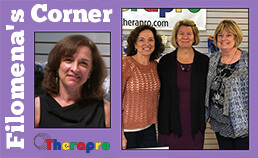
Therapro’s October 13th Saturday Seminar featured Margaret (Peggy) Morris, OTD, OTR/L, BCP, who presented her seminar, Pediatric Occupation-Based Assessment. Her review of a variety of pediatric assessment tools was comprehensive and enlightening.
Peggy has had a distinguished career as a pediatric occupational therapist, practicing in schools and private practice. Currently she is a faculty member in Tufts University’s Graduate Occupational Therapy Department. In addition, she is has presented workshops nationally and has been a Certified National Presenter for Handwriting without Tears.
Peggy contends that “occupational therapists have, at the heart and soul of their being, a focus on participation in meaningful occupations.” She distinguished between two assessment frameworks that current assessments occupy: the International Classification of Function (ICF) and OT Practice Framework, 3rd ed. (OTPF3). Interestingly, assessments that are in the ICF category may not be occupational therapist-designed, and focus on the assessment of body function and structures that may limit function. The assessments in the OTPF3 category are occupation-based tools that assess function in “wanted and needed” occupations, and are being developed or have been developed by occupational therapists. The occupation-based tools have the added advantage that they can be used to determine progress versus only improved scores. Peggy noted that the very first occupation-based tool that requires clinical reasoning was the School Function Assessment. It appears that the OTPF3 group includes the important feature of attaining the student’s view of what he/she would like to focus on, i.e. student’s goal. Peggy pointed out commonalities between the two assessment categories to be considered when selecting an assessment tool. She mentioned the GOAL, Goal Oriented Assessment of Life Skills and Miller Function and Participation Scales (M-FUN) as hybrid tools.
A number of assessment tools were discussed that have empirical data associated with them. An interesting study highlighted the tools that therapists choose. The Beery VMI and the BOT-2 were at the top of the list. The Beery is a “bottom up” assessment that looks at student factors like body structures and function. On the other hand, a “top down” assessment tool offers an occupation-based way to provide services. A highly recommended tool was the COPM, Canadian Occupational Performance Measure, which was designed as an outcome tool.
Peggy discussed making an important distinction between “clinical reasoning” and “contextual or environmental observation” when evaluating a student. Clinical reasoning tells what you observe, i.e. convergence of the eyes, whereas contextual/environmental observation refers to observation of function in the classroom. She suggested that in the therapist’s assessment report that contextual/environmental observations be listed and discussed as the first tool used in the assessment to highlight its importance.
To gradually shift our focus to occupation-based and participation-based measures for assessments, versus only performance-based measures, Peggy suggested we review assessment results with parents and teachers by discussing qualitative results first, and then the scores the child received. With more occupation-based tools emerging, we can provide more meaningful evaluation of a student’s school function, and plan therapy that is also meaningful to the student!
Take a look at some of the extremely positive comments from attendees:
“This presentation reminds me of why I became an OT! This brings back the
importance of connection & what is truly meaningful. Thank you.” – Tara G., Occupational Therapist
“It helped me to think more broadly about how to assess the students I work
with. It also helped to think about keeping the student’s desires in
perspective and a priority.” – Cindy M., COTA
“Fascinating to hear about new resources, (new/old?) ways to approach how we think and can change our practice! Thanks so much!” – Beth B., Occupational Therapist
“Well presented. Made me think about questions that I didn’t know I had.” – Trisha L., Occupational Therapist
“It brings our practice forward into a more function-based orientation by challenging old mindsets.” – Marion S., Occupational Therapist
Thank you, Peg!
Filomena Connor, MS, OTR/L
October 13, 2018
